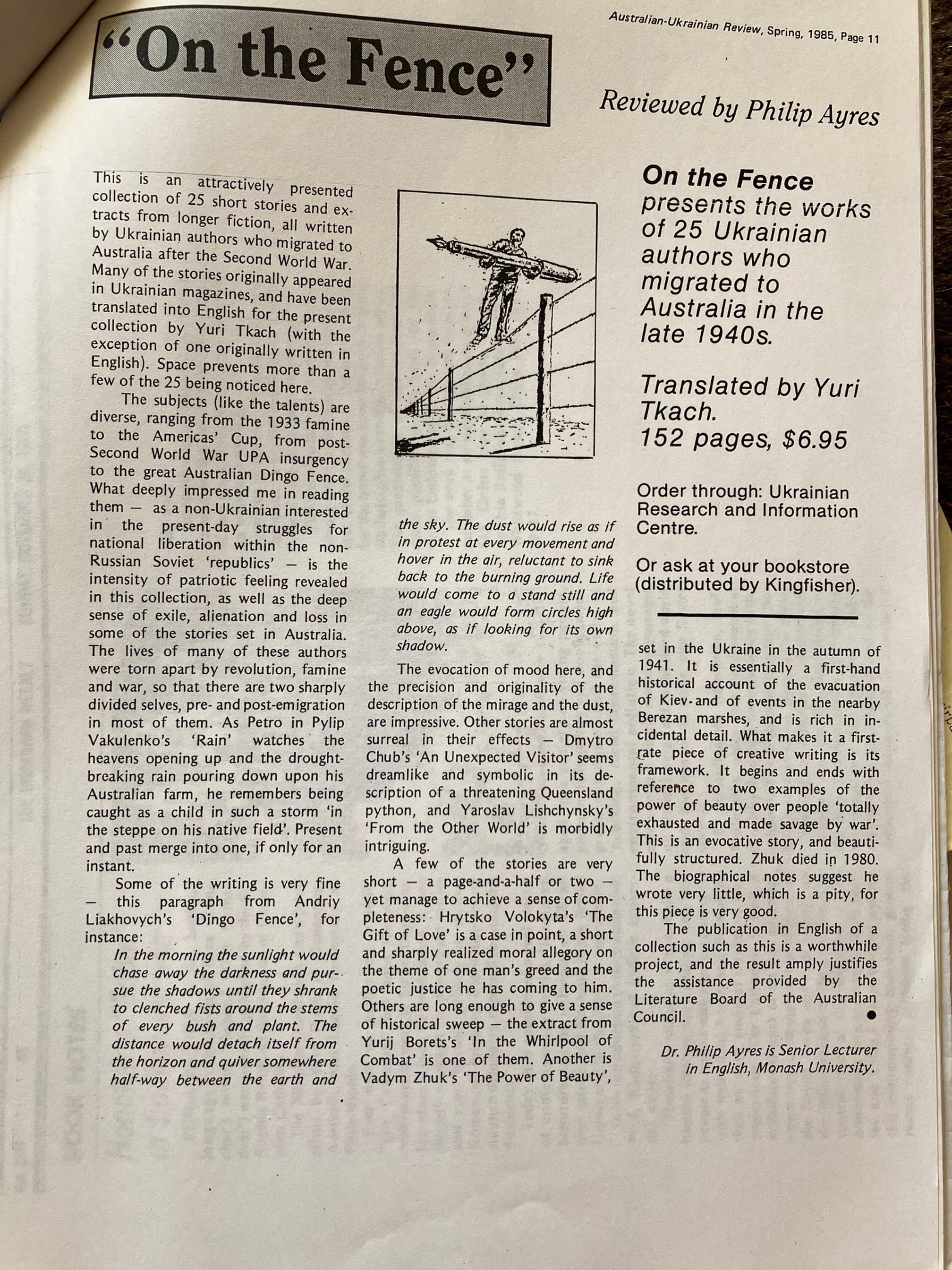Australian Ukrainian Review 1985, “On the Fence“ reviewed by Philip Ayres
"On the Fence"
Reviewed by Philip Ayres
On the Fence presents the works of 25 Ukrainian authors who migrated to Australia in the late 1940s.
Translated by Yuri Tkacz.
152 pages, $6.95
Order through: Ukrainian Research and Information Centre or ask at your bookstore (distributed by Kingfisher).
This is an attractively presented collection of 25 short stories and extracts from longer fiction, all written by Ukrainian authors who migrated to Australia after the Second World War. Many of the stories originally appeared in Ukrainian magazines and have been translated into English for the present collection by Yuri Tkacz (with the exception of one originally written in English). Space prevents more than a few of the 25 being noticed here.
The subjects (like the talents) are diverse, ranging from the 1933 famine to the Americas’ Cup, from post-Second World War UPA insurgency to the great Australian Dingo Fence. What deeply impressed me in reading them—as a non-Ukrainian interested in the present-day struggles for national liberation within the non-Russian Soviet ‘republics’—is the intensity of patriotic feeling revealed in this collection, as well as the deep sense of exile, alienation, and loss in some of the stories set in Australia. The lives of many of these authors were torn apart by revolution, famine, and war, so that there are two sharply divided selves, pre- and post-emigration in most of them.
As Petro in Pylip Vakulenko’s Rain watches the heavens opening up and the drought-breaking rain pouring down upon his Australian farm, he remembers being caught as a child in such a storm “in the steppe on his native field.” Present and past merge into one, if only for an instant.
Some of the writing is very fine—for example, this paragraph from Andriy Liakhovych’s Dingo Fence:
"In the morning the sunlight would chase away the darkness and pursue the shadows until they shrank to clenched fists around the stems of every bush and plant. The distance would detach itself from the horizon and quiver somewhere half-way between the earth and the sky. The dust would rise as if in protest at every movement and hover in the air, reluctant to sink back to the burning ground. Life would come to a standstill, and an eagle would form circles high above, as if looking for its own shadow."
The evocation of mood here, and the precision and originality of the description of the mirage and the dust, are impressive. Other stories are almost surreal in their effects—Dmytro Chub’s An Unexpected Visitor seems dreamlike and symbolic in its description of a threatening Queensland python, and Yaroslav Lishchynsky’s From the Other World is morbidly intriguing.
A few of the stories are very short—just a page and a half or two—yet manage to achieve a sense of completeness. Hrytsko Volokyta’s The Gift of Love is a case in point, a short and sharply realized moral allegory on the theme of one man’s greed and the poetic justice he has coming to him. Others are long enough to give a sense of historical sweep—the extract from Yurij Borets’s In the Whirlpool of Combat is one of them. Another is Vadym Zhuk’s The Power of Beauty, set in Ukraine in the autumn of 1941. It is essentially a first-hand historical account of the evacuation of Kyiv and of events in the nearby Berezan marshes, rich in incidental detail. What makes it a first-rate piece of creative writing is its framework. It begins and ends with references to two examples of the power of beauty over people “totally exhausted and made savage by war.” This is an evocative story, beautifully structured. Zhuk died in 1980. The biographical notes suggest he wrote very little, which is a pity, for this piece is very good.
The publication in English of a collection such as this is a worthwhile project, and the result amply justifies the assistance provided by the Literature Board of the Australian Council.
Dr. Philip Ayres is a Senior Lecturer in English, Monash University.

